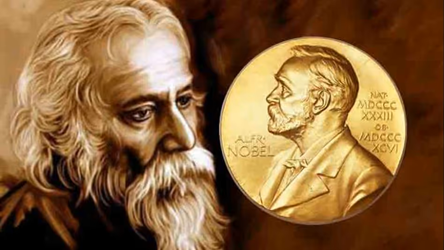
Early Life and Background
Rabindranath Tagore was born on May 7, 1861, in Calcutta (now Kolkata), India, into a wealthy and culturally rich Bengali family. The youngest of thirteen children, he was exposed to music, literature, and philosophy from an early age. Despite disliking formal schooling, he was a voracious learner and began writing poetry at a young age.
Tagore traveled to England at 17 to study law but returned without a degree, choosing instead to focus on literature and the arts.
Literary Achievements
Tagore's literary output is vast and spans poetry, short stories, novels, plays, and essays. His 1910 collection Gitanjali ("Song Offerings"), which he translated into English, earned him the Nobel Prize in Literature in 1913. His writing often explored themes of nature, spirituality, love, nationalism, and the human condition.
Tagore wrote in both Bengali and English, crafting a unique lyrical voice that blended the traditional with the modern. His influence spread far beyond India, with contemporaries such as W.B. Yeats admiring and promoting his work.
Philosophy and Education
A thinker deeply concerned with the human spirit, Tagore believed education should nurture creativity and freedom rather than rote learning. In 1921, he founded Visva-Bharati University at Santiniketan, a school that emphasized holistic learning and international collaboration.
His educational philosophy was rooted in harmony between man and nature, East and West, tradition and progress.
Political and Social Views
Although Tagore supported Indian independence, he was not aligned with any political party. He advocated for dignity, dialogue, and non-violence. In 1919, he renounced his British knighthood in protest against the Jallianwala Bagh massacre.
Tagore warned against narrow nationalism and urged unity based on shared humanity, making him a global ambassador for peace.
Musical and Artistic Legacy
Tagore was also a gifted musician and artist. He composed over 2,000 songs, now known as Rabindra Sangeet, which remain popular in Bengal and beyond. He also painted in his later years, producing hundreds of works.
Remarkably, he wrote the lyrics for both India's (Jana Gana Mana) and Bangladesh's (Amar Shonar Bangla) national anthems, and his influence extends to Sri Lanka’s anthem as well.
Death and Legacy
Rabindranath Tagore died on August 7, 1941. His death marked the end of an era, but his legacy lives on through his writings, music, and educational ideals.
Tagore's vision of a world united by compassion, culture, and learning remains more relevant than ever in the modern age.
Conclusion:
Rabindranath Tagore was not just a poet—he was a philosopher, educator, reformer, and a spiritual guide. His life’s work helped shape modern Indian identity and world literature. In bridging Eastern and Western thought, Tagore offered a timeless message: that beauty, truth, and humanity transcend borders.

You must be logged in to post a comment.